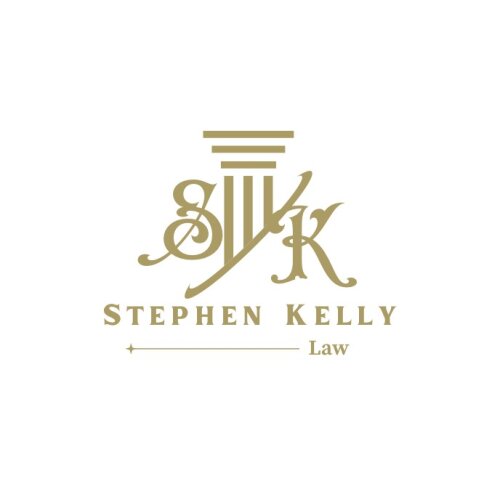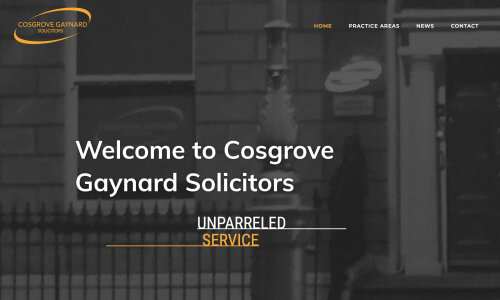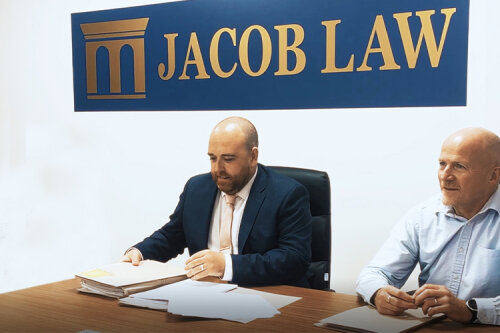Best Conveyancing Lawyers in Ireland
Share your needs with us, get contacted by law firms.
Free. Takes 2 min.
Free Guide to Hiring a Real Estate Lawyer
Or refine your search by selecting a city:
List of the best lawyers in Ireland
About Conveyancing Law in Ireland
Conveyancing is the legal process of transferring ownership of property from one party to another. In Ireland, this process involves a series of steps to ensure that the buyer receives proper title to the property and that all legal obligations are met. Conveyancing covers not only the sale and purchase of residential or commercial property but also lease agreements, mortgage transactions, and the registration of property with the Land Registry or Registry of Deeds. The rules governing conveyancing in Ireland are designed to provide security in property transactions and are primarily based on Irish statutory law, case law, and standard practices developed within the legal profession.
Why You May Need a Lawyer
A conveyancing lawyer plays a crucial role in property transactions, given the complexity of Irish property law. Here are some common situations where legal assistance in conveyancing is essential:
- When buying or selling property, to manage contracts, ensure proper transfer of title, and handle legal documentation. - Dealing with mortgages or refinancing, as banks often require a solicitor to ensure legal compliance. - Handling boundary disputes or issues related to rights of way. - Transferring property after inheritance or divorce. - Purchasing property at auction, which involves stricter timeframes and additional risks. - Ensuring compliance with planning and building regulations. - Reviewing and conducting all necessary searches, such as planning, environmental, or title searches.
A qualified solicitor helps safeguard your interests, manages potential legal pitfalls, and streamlines an often stressful process.
Local Laws Overview
Conveyancing in Ireland is governed by several key laws and regulations. The process varies depending on whether the property is registered or unregistered:
- Land Registry and Registry of Deeds: The Land Registry system holds records of property ownership for registered properties, while the Registry of Deeds handles older, unregistered properties. - Legal Title: Irish law recognizes both freehold (full ownership) and leasehold (limited rights for a defined period) properties. - Contract for Sale: Under Irish law, a contract for sale must be in writing and include key details about the property, the parties involved, and any special conditions. - Pre-Contract Enquiries and Searches: These are performed to check for planning permissions, compliance with building regulations, and any existing charges or burdens on the property. - Stamp Duty: Buyers must pay stamp duty on the transfer, calculated as a percentage of the purchase price. - Registration: Once the transfer is complete, the buyer’s ownership must be officially registered with the relevant authority.
These laws help protect both buyers and sellers, making it vital to engage a solicitor familiar with Irish conveyancing practice.
Frequently Asked Questions
What does a conveyancing solicitor do?
A conveyancing solicitor manages all legal aspects of buying, selling, or transferring property. This includes preparing and reviewing contracts, conducting legal searches, liaising with financial institutions, paying stamp duty, and registering the property in your name.
How long does the conveyancing process usually take in Ireland?
On average, the conveyancing process takes between 8 to 12 weeks. However, this timeframe can vary depending on factors such as title issues, delays in securing finance, or complications discovered during legal searches.
What is the difference between registered and unregistered land?
Registered land is recorded in the Land Registry, providing a state-guaranteed title. Unregistered land is recorded with the Registry of Deeds, and evidence of ownership comes from a chain of title deeds. The process for transferring each is different, often making registered property easier to deal with.
What searches are typically conducted during conveyancing?
Common searches include title searches, planning authority searches, environmental searches, bankruptcy searches, and checking for rights of way or burdens on the property.
Do I need to pay stamp duty?
Yes, stamp duty is payable by buyers on most property transactions in Ireland. The rate differs for residential and non-residential properties and is calculated as a percentage of the purchase price.
Can I do my own conveyancing in Ireland?
While it is technically possible to conduct your own conveyancing, it is strongly discouraged due to the complexity of Irish property law and the risks of missing important legal issues. For most people, engaging a solicitor is essential.
What happens on the day I get the keys?
On completion day, the purchase money is transferred to the seller, and you receive the keys and possession of the property. The solicitor then handles post-completion tasks, including paying stamp duty and registering your ownership.
What if issues are discovered with the property during conveyancing?
If problems such as faulty planning permission, undisclosed liabilities, or disputes arise, your solicitor will advise on solutions. These might include negotiating with the seller, seeking compensation, or withdrawing from the purchase if necessary.
Do I need to be present in Ireland to buy or sell property?
You do not need to be present, but you must appoint a solicitor to act on your behalf. You may also need to provide additional documentation to verify your identity and comply with anti-money laundering requirements.
How are fees for conveyancing solicitors calculated?
Fees vary depending on the complexity and value of the transaction. Solicitors may charge a flat fee or a percentage of the property price. Always ask for a detailed quote before beginning the process.
Additional Resources
Several organizations and governmental bodies offer guidance and information on conveyancing in Ireland:
- The Law Society of Ireland provides information on choosing a solicitor and explains the conveyancing process. - The Property Registration Authority (PRA) offers resources on property registration and title searches. - The Citizens Information Board provides accessible factsheets on buying and selling property. - Local county or city councils can provide information on planning permissions and local property regulations.
Next Steps
If you are considering buying, selling, or transferring property in Ireland, here is how to proceed:
1. Gather relevant information about the property, including title documents and any planning permissions. 2. Research and contact a reputable conveyancing solicitor experienced in Irish property law. 3. Discuss your situation and request a detailed quote for legal services. 4. Provide your solicitor with all necessary documentation and respond promptly to any queries. 5. Allow your solicitor to guide you through each stage, from contracts and searches to completion and registration. 6. If you have concerns during the process, do not hesitate to ask your solicitor for clarification or further information.
Getting legal advice from a qualified solicitor is the safest way to ensure your property transaction is secure, compliant, and successful.
Lawzana helps you find the best lawyers and law firms in Ireland through a curated and pre-screened list of qualified legal professionals. Our platform offers rankings and detailed profiles of attorneys and law firms, allowing you to compare based on practice areas, including Conveyancing, experience, and client feedback.
Each profile includes a description of the firm's areas of practice, client reviews, team members and partners, year of establishment, spoken languages, office locations, contact information, social media presence, and any published articles or resources. Most firms on our platform speak English and are experienced in both local and international legal matters.
Get a quote from top-rated law firms in Ireland — quickly, securely, and without unnecessary hassle.
Disclaimer:
The information provided on this page is for general informational purposes only and does not constitute legal advice. While we strive to ensure the accuracy and relevance of the content, legal information may change over time, and interpretations of the law can vary. You should always consult with a qualified legal professional for advice specific to your situation.
We disclaim all liability for actions taken or not taken based on the content of this page. If you believe any information is incorrect or outdated, please contact us, and we will review and update it where appropriate.
Browse conveyancing law firms by city in Ireland
Refine your search by selecting a city.
















